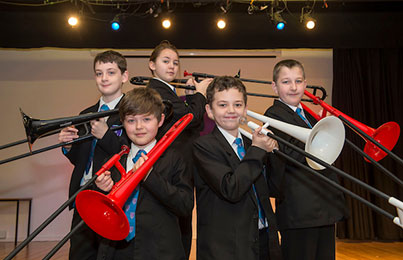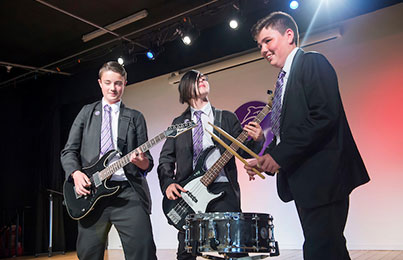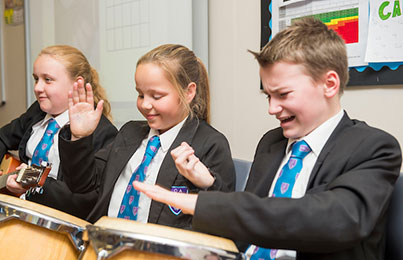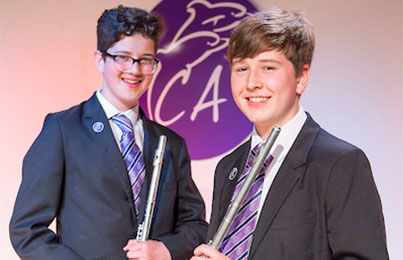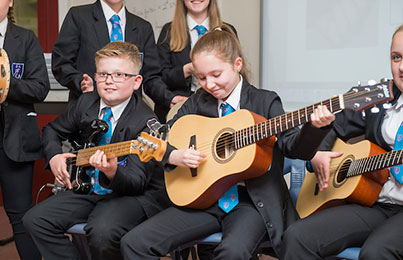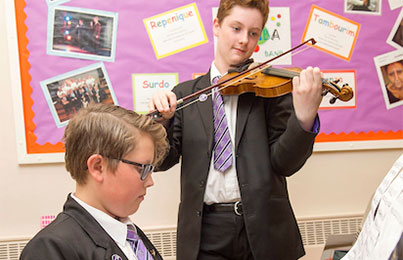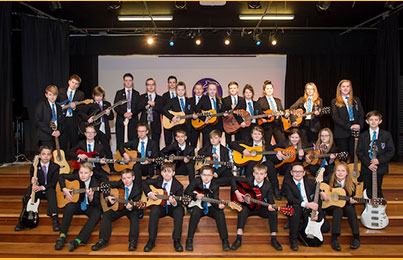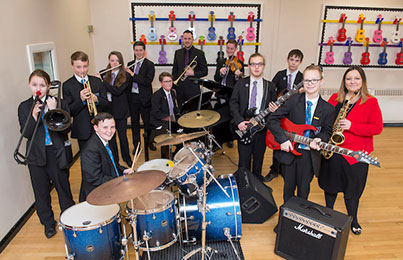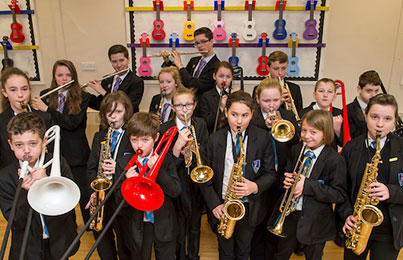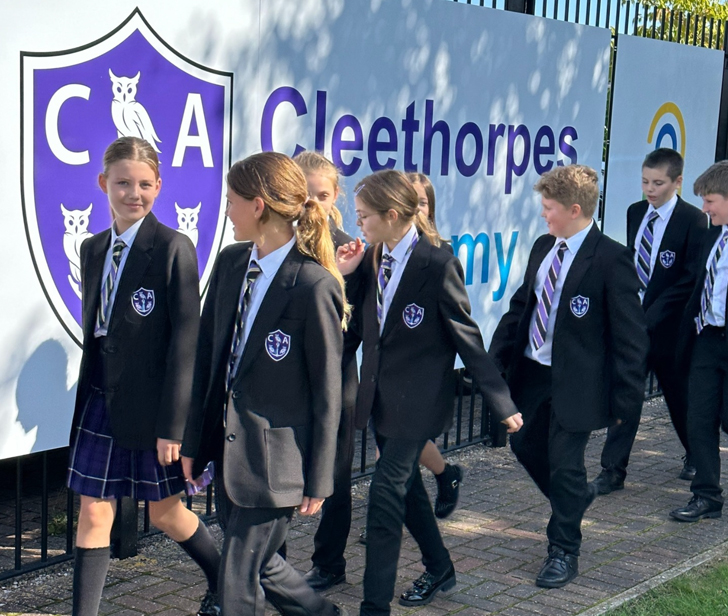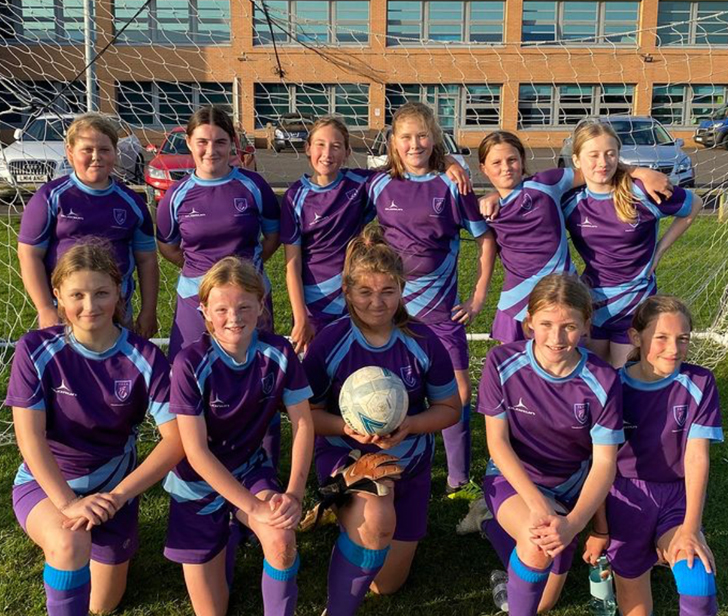Music
- Music
- Ethos & Values
- Knowledge & Skills
- Resources & Facilities
- Courses & Qualifications
- Learning Outside The Classroom
- Where Does This Take Me In The Future?
Music
We view music as an essential element in a balanced education, allowing personal expression, personal development, creativity and real practical involvement in the arts. Students gain confidence, skills and an appreciation of each other's talents, through a broad and varied curriculum.
Please explore these pages to find out more about what we offer.
Ethos & Values
We aim to:
- Provide students with skills, knowledge and confidence in all disciplines of music and creative studies.
- Foster students' sensitivity to, and their understanding and enjoyment of all aspects of music, including world music.
- Work within the ethos of 'Every Child Matters' and provide musical experiences and nurture musical development of all students.
- Incorporate British values within lessons.
- Ensure high quality and effective lessons.
- Encourage students to take ownership of their own creations and performances.
- Enable students to experience live musical performances and to work with professional artists in workshops and performances, in a variety of genres.
- Have consistently high expectations and match these with high quality resources and learning strategies.
- Encourage students to become independent learners.
Knowledge & Skills
- Students learn about the basic elements of music, so as to be able to compose, perform and listen to music with greater understanding.
- Students learn how to play a range of instruments and use them for performance and composition purposes.
- All students are given the opportunity to have vocal or instrumental tuition and are encouraged to use their instruments in class lessons.
- Students are encouraged to share their work with others to build confidence.
- Musical performances are recorded and used in self and peer evaluation.
- All students are encouraged to participate in concerts at the Academy and in the wider community.
Resources & Facilities
We have 2 full time members of staff in the Curriculum Area, as well as visiting instrumental teachers.
The Music area comprises of 2 keyboard suites equipped with interactive whiteboards. One of the classrooms is also equipped with computers, enabling students to access software such as Cubase 6 and Sibelius 7.
We have 2 practice rooms which are used for instrumental lessons and for band/ ensemble work.
There is a music hall fully equipped with a state of the art electric baby grand piano. The space allows for lots of practical work in KS3, such as Samba, African drumming, Ukulele groups and singing, as well as KS4 GCSE performances.
In all the classrooms, wall space is positively used to create informative and stimulating displays that reflect modern practices, support the projects and create an expectation for achievement.
Courses & Qualifications
Key Stage 3
All students have one lesson a week and follow a varied programme of music, which involves performing, composing and listening. Students work through a variety of stimulating and exciting topics, which are updated regularly.
These currently include: basic music theory and the reading of music, introduction to keyboard skills, ukulele skills, film music, the voice, Caribbean music, samba, African music, blues and jazz, music in the media, pop, dance, class band and song writing.
Key Stage 4
Creative Studies – the NCFE Level 2 certificate in performance skills using music.
This qualification aims to develop students' existing skills in music, and to improve technique and performance ability. It also provides an opportunity for students to develop their skills within the performance industry.
This qualification consists of 2 mandatory units:
- Unit 1 Develop technique for performance
- Unit 2 Rehearse and perform
And three optional units (one must be chosen):
- Unit 3 Developing as a musical performer
- Unit 4 Solo musical performance
- Unit 5 Working as a musical ensemble
And one additional unit:
- Unit 6 Working in the performing arts industry
How is it assessed?
Students are required to produce a portfolio of evidence that meet the standards set in the qualification. Evidence for each standard can vary and can include worksheets, recordings, feedback, diaries, videos, vlogs etc.
Music
Students have the opportunity to complete a music GCSE course following the Edexcel specification.
Performing and composing accounts for 60% of the final mark, with the final listening exam being the remaining 40%. During the course, students study 8 set works covering four areas of study, from 1600 to the present day. In the final exam, they are expected to be able to answer questions from the set works.
Instrumental / Vocal Examinations
Students that are taking singing or instrumental lessons are encouraged to work towards grade exams with ABRSM, Trinity Guildhall or London College.
Learning Outside The Classroom
Cleethorpes Choir
This is open to anyone who enjoys singing in a group. Students from year 7 to 11 are involved. There is always opportunity for students to take on solo parts in the concerts.
Harmonix
This is a more advanced singing group for students from years 7-11, who enjoy singing acapella and in close harmonies
Samba Band, Upper and Lower School
This group is open to students who want to have fun and play in a percussion ensemble.
Trombone group
This is for beginners to learn how to play the trombone and to experience playing in an ensemble. It is open to years 7 and 8. No previous experience is necessary.
Cleethorpes Band
Open to any student, from years 7 -11, who can play a musical instrument. A great opportunity for ensemble playing and participation in concerts.
Interhouse Music Competition
This takes place each year. It is open to any students in years 7 to 11 who can sing or play an instrument. It doesn't matter if you have grade 8 or have taken no exams at all, anyone can sign up to represent their house.
Where Does This Take Me In The Future?
- Students who achieve a qualification in creative studies could go on to take a level 2 certificate in performance skills using dance or drama. They could also go on to take a creative and media diploma.
- GCSE Music provides a good basis for studying Music at higher level.
- Many of our students go on to study Music at college and beyond.
